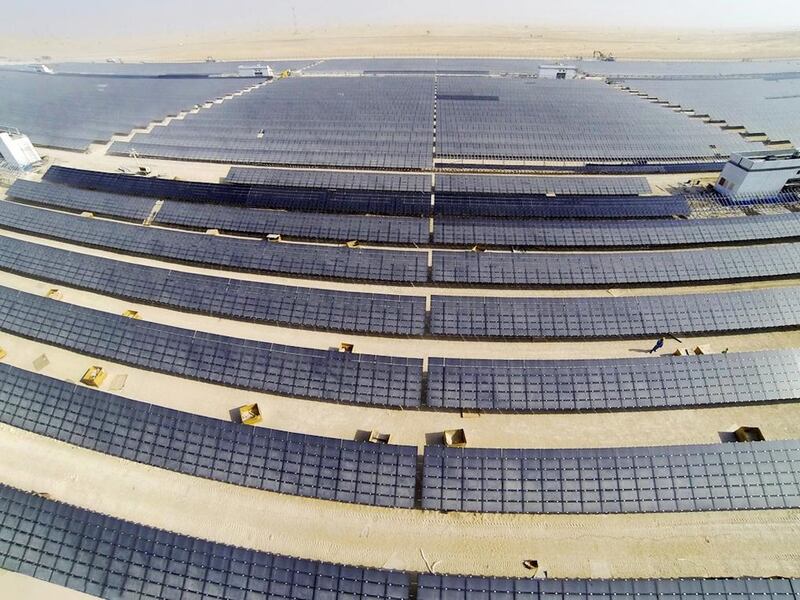The biggest event to happen in the renewables industry this year was the rapid price drop in large-scale projects, with the UAE taking a seat among the countries with the world's cheapest costs for renewable energy power generation.
The first major event occurred in Dubai, in the summer, when Abu Dhabi's Masdar with its Spanish partner Fotowatio Renewable Ventures won the 800 megawatt third phase in the Mohammed bin Rashid Al Maktoum Solar Park by offering 2.99 US cents per kilowatt hour, marking the cheapest solar price in the world at that time.
“That was a major milestone in the life of Masdar. We not only broke the world record in terms of tariffs that we proposed to Dewa [Dubai Electricty and Water Authority] but we’re going to be building the largest solar park in one location,” said Mohammed Al Ramahi, Masdar’s chief executive.
Price wars continued in other places such as Chile where the Spanish company Solarpack will build a 120MW plant for 2.91 cents per kWh.
Adnan Amin, the director general of Abu Dhabi-based International Renewable Energy Agency (Irena), said that this year has highlighted the increasing cost-competitiveness of renewable energy. “Deals to develop large-scale solar projects were signed for 3 cents per kWh or less in Mexico, Chile and right here in the UAE. And Morocco secured an average bid of just 3 cents per kWh from its tender for large scale wind energy projects, with the lowest tariff at around 2.5 cents per kWh,” he said.
The UAE is a candidate for another record-breaking price. In September, Abu Dhabi’s upcoming 350MW solar PV project in Sweihan received six bids. Japan’s Marubeni and Jinko Solar submitted a bid at 2.42 US cents per kWh but bids are still under review as no official agreement has been signed with Abu Dhabi Water and Electricity Authority (Adwea). The top three bids submitted are all lower than Chile’s 2.91 cents per kWh.
The energy watchdog International Energy Agency (IEA) said that these prices, under an auction-type system, might not be the true costs of the solar energy. “Auction prices also reflect companies’ bidding strategies; they may accept unusually low returns on an investment in order to gain a competitive advantage in the market,” the IEA said in its World Energy Outlook released in November.
Government policies and financing mechanisms have also had a positive effect on the market. Global renewable-energy investment rose to US$285.9 billion last year from $278.5bn the year earlier, according to the United Nations Environment Programme. The amount of generating capacity added in wind and solar PV totalled 118GW, over 25 per cent more than seen in 2014. And Bloomberg New Energy Finance says that renewable energy investments will only continue to grow between now and 2040 to $7.8 trillion, making up three times more than the amount expected for fossil fuels.
What does this mean for the average consumer in the UAE? Not much right now but it will have an impact in the future.
Electricity bills are determined by numerous factors such as how much the utility pays for the feedstock, which in Abu Dhabi’s case is mostly natural gas, about 98 per cent. To put this into perspective, natural gas for power runs at about 6 US cents per kWh whereas solar developers in the country are looking to sell electricity for less than half that amount.
These low solar energy prices aren’t translating into major savings for the average resident consumer, as the projects aren’t complete, but the potential for cheaper energy that is actual cost rather than a subsidised rate could become a reality in the near future. “These developments underscore that the business case for renewable energy has truly reached a tipping point,” said Mr Amin. “Efforts now need to turn to scaling up renewables in end-use sectors such as transportation, industry, and heating and cooling.”
lgraves@thenational.ae
Follow The National's Business section on Twitter





